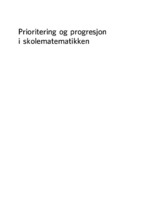Prioritering og progresjon i skolematematikken
En nøkkel til å lykkes i realfag. Analyser av TIMMS Advanced og andre internasjonale studier
| dc.contributor.author | Onstad, Torgeir | |
| dc.contributor.author | Borge, Inger Christin | |
| dc.contributor.author | Stedøy, Ingvill Merete | |
| dc.contributor.author | Draagen, Marie Vaksvik | |
| dc.contributor.author | Røst Veflingstad, Siren | |
| dc.contributor.author | Hagen, Tor Espen | |
| dc.contributor.editor | Grønmo, Liv Sissel | |
| dc.contributor.editor | Hole, Arne | |
| dc.date.accessioned | 2017-11-01 23:55:55 | |
| dc.date.accessioned | 2018-06-28 15:17:11 | |
| dc.date.accessioned | 2020-04-01T13:20:13Z | |
| dc.date.available | 2020-04-01T13:20:13Z | |
| dc.date.issued | 2017 | |
| dc.identifier | 640613 | |
| dc.identifier | OCN: 1030819460 | en_US |
| dc.identifier.uri | http://library.oapen.org/handle/20.500.12657/30990 | |
| dc.description.abstract | Norway is a leading country in the world when it comes to not prioritizing algebra in school mathematics, the mathematical language many students will need for further education and professions. Analysis of data from TIMSS, TIMSS Advanced and other international comparative studies have concluded that this result is consistent across 20 years of research. Norwegian students perform well in domains such as statistics/data, and alarmingly low in algebra. This conclusion is based on data from all levels in school: Primary school, lower secondary school, upper secondary school, and teacher education. The international studies indicate that East Asian, Eastern European and Latin European countries prioritize algebra more strongly than Norway or other Nordic and English-speaking countries. Several of the countries performing well in algebra, also seem to have some sort of balance between teaching algebra and teaching statistics, while there is a huge difference between the student scores on these domains in Norway. It almost seems as though “students learn statistics instead of learning algebra”. The importance of taking into account the type of mathematical content which is tested in different studies before drawing conclusions, is also addressed in the book. For instance, PISA mathematics is compared to TIMSS grade 8 mathematics when it comes to mathematical theory involvement. On the other hand, it is emphasized that it is necessary to have information from different studies to make valid conclusions concerning mathematics in schools. The importance of cooperation between countries all over the world in developing school mathematics, with countries learning from each other, is also discussed. The book is a result of cooperation between researchers at the Department of teacher education and school research (ILS) and the Department of mathematics, both at the University of Oslo, and school teachers in an upper secondary school. The results are discussed from a teacher education perspective, a school teacher perspective and from the perspective of the national curriculum for schools in Norway. Some of the chapters in the book are devoted to going through all the test items in TIMSS Advanced 2015 which can be published, and it is described how these items can be used both by teachers in school and in teacher education at universities. | |
| dc.language | Uncoded languages | |
| dc.subject.classification | thema EDItEUR::J Society and Social Sciences::JN Education | en_US |
| dc.subject.classification | thema EDItEUR::P Mathematics and Science::PB Mathematics | en_US |
| dc.subject.other | timms | |
| dc.subject.other | mathematics | |
| dc.subject.other | algebra | |
| dc.subject.other | undervisning | |
| dc.subject.other | skole | |
| dc.subject.other | matematikk | |
| dc.subject.other | education | |
| dc.title | Prioritering og progresjon i skolematematikken | |
| dc.title.alternative | En nøkkel til å lykkes i realfag. Analyser av TIMMS Advanced og andre internasjonale studier | |
| dc.type | book | |
| oapen.abstract.otherlanguage | "Denne boka presenterer forskningsresultater om matematikk på alle nivåer i skolen (barneskole, ungdomsskole, videregående skole) over de siste 20 årene. Norge har deltatt i internasjonale komparative studier fra 1995 til 2015 i regi av IEA (TIMSS Advanced, TIMSS, TEDS-M) og OECD (PISA). De fleste av disse studiene gjennomføres nå med jevne mellomrom. Sentrale forskningsspørsmål for boka er: -Hvilke konsistente forskningsresultater for skolematematikk finner vi, basert på data over 20 år fra alle disse studiene? -Hvilke utfordringer har norsk skole hvis elevene skal få den matematiske basiskunnskapen de trenger for videre utdanninger og yrker? Hvordan resultatene fra disse studiene kan bidra til bedre undervisning i skolen, og til å lette overgangen fra videregående skole til høyere utdanning for elevene, står sentralt i boka. Disse problemstillingene er noe av bakgrunnen for samarbeidet om boka mellom Institutt for lærerutdanning og skoleforskning (ILS), Universitetet i Oslo; Lillestrøm videregående skole i Akershus; Matematisk institutt, Universitetet i Oslo; og Matematikksenteret, NTNU i Trondheim." | |
| oapen.identifier.doi | 10.23865/noasp.26 | |
| oapen.relation.isPublishedBy | bf7b42a4-6892-42e3-aaf8-8f32c8470a8b | |
| oapen.relation.isFundedBy | c273ec27-d2be-4f1d-8917-141b286f1657 | |
| oapen.pages | 318 | |
| oapen.place.publication | Oslo | |
| oapen.identifier.ocn | 1030819460 |

